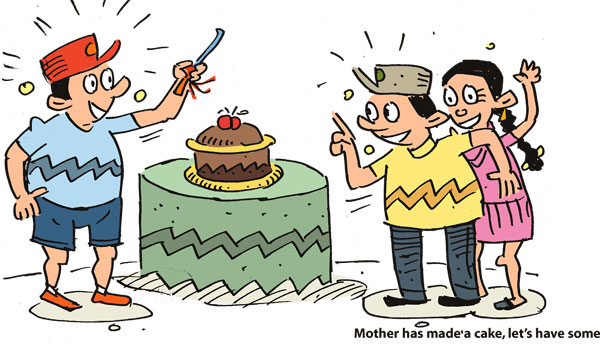|

by R. S. Karunaratne
Present perfect and simple past tenses
We use the present perfect tense when we think about the past and the
present together. In other words, we are left with a result because of a
past action.
Amanda has met with an accident. (She is in hospital)

Mother has made a cake, let’s have some.
Father has reported the burglary to the police.
I’ve bought a new car. Come and have a look at it.
Varuni has bought a new dress. It’s beautiful.
When we use the simple past tense we only think of the past, not the
present.
My grandfather taught me how to write essays.
We went to Kandy during the holidays.
Rosy bought a new dress for her sister’s wedding.
Grandmother used to come and stay with us.
Jane went to Australia at the age of 16.
We do not use the present perfect tense for a finished action. So, it
is wrong to say, “I’ve seen Robert yesterday.” Say, “I saw Robert
yesterday.”
Note the difference between ‘gone to’ and ‘been to’ in the present
perfect tense.
Wimala has gone to England. (She is there now.)
I’ve been to Italy. (I’ve come back.)
We use the simple past tense, not the present perfect tense, in
stories.
A jackal once got a thorn in his paw. “Oh, Oh!” he cried as he walked
along a road in the forest. Then he met an old woman.
“Please, dear granny,” he said, “pull the thorn out of my paw.”
The old woman pulled it out. The jackal thanked her and went away.
We often use the present perfect tense to announce news over the radio
or television.
Bangladesh Prime Minister has arrived in Russia for talks with the
President.
The government has declared a special holiday.
A plane has crashed at the Heathrow airport.

An unidentified flying object (UFO) has been sited in Bandarawela.
Somebody has stolen my car!
We do not use the present perfect tense with time expressions. So, it
is wrong to say, “A plane has crashed at the Heathrow airport today.”
Say, “A plane has crashed at the Heathrow airport.”
[Activity]
Fill in the blanks with the correct form of the verbs given in
brackets. Check your answers with the key.
1. The jackal 1. ............ (come) to a village and 2. ...........
(knock) at the door of the first house. A man 3. ............ (open) it.
“May I stay the night with you? It is late and cold outside,” 4.
........... (say) the jackal. “Come in,” 5. ............ (answer) the
man. The jackal 6. ............. (come) in. “May I put my egg on this
plate?” the jackal asked. “Yes, you may,” 7. ......... (say) the man. In
the night the jackal got up, ate the egg and put the shell back on the
plate.
In the morning the jackal 8. ........... (ask) the man, “Where is my
egg?”
2. Put in simple past or present perfect verbs in the blanks. Check
your answers with the key.
A. The dog ............. the piece of cake you gave me. (eat)
B. Mary ............... her job at a newspaper office. Now she is
jobless. (leave)
C. Semini ............. a beautiful sari yesterday. (buy)
D. Perera ............ his house for Rs million. Now he is quite rich!
(sell)
E. Grandfather .............. his glasses under the pillow a little
while ago. (find)
F. John ............. with an accident. He is in a wheel chair.
(meet)
G. Sam ............. Rs. 10,000 from the bank yesterday. (withdraw)
H. I haven’t ............. from Sanka for a long time. (hear)
I. I’ve already ............. my mother about you. (tell)
J. Two passengers ............ in the accident. (die)
Key:
I. 1. came 2. knocked 3. opened 4. said 5. answered 6. came 7. said
8. asked
II. A. has eaten B. has left C. bought D. has sold E. found F. has
met G. withdrew H. heard I. told J. have died
Starters:
More on the use of present perfect tense
We use the present perfect tense to say how much we have done
something up to now.
Harendra has done several different jobs since graduation.
Rani saves Rs 1,000 a month. Up to now she has saved Rs 60,000.

Mother has made 30 cups of yoghurt since morning.
I have read five novels up to now.
The secretary has typed four letters since breakfast.
We use the present perfect tense to say how often things have
happened up to now.
I have seen The Titanic five times.
Nirmala has been to Jaffna only once.
Father has often wanted to come and help you in your business.
Nelum has broken her arm three times.
Joe has changed his job twice this year.
We use the present perfect tense to ask whether things have happened
up to now or to say that things haven't happened up to now. We often use
‘ever’ and ‘never’ for this purpose.
Have you ever been to the Himalayas?
Grandfather has never been to Sri Pada.
Have you ever broken your leg?
Prasad has never written to me.
We have never been to Australia.
We often use the present perfect tense with ‘already’ which means
‘earlier than somebody expected.’
The minister has already come for the opening ceremony.
We are late. The film has already started.
A: Do you want to read the Sunday Observer?
B: No, I've already read it.
A: Where's Mallika?
B: She's already gone.
A: When does the film show start?
B: It has already started.
We use the present perfect tense with ‘yet’ meaning ‘up to now.’
A: Have you spoken to the principal?
B: No, not yet.
A: Has Anura come to office?
B: No, he hasn't come in yet.
Has my sister phoned yet?
The milkman hasn't come yet.
Lionel hasn't found a job yet.
We use the present perfect tense with ‘just’ meaning ‘a short time
ago.’ ‘Just’ usually comes after ‘have’ or ‘has.’
I've just written a letter to my friend.
She has just finished answering the question paper.
I've just thought about you.
She has just crossed the road.
Leel has just left office.
We use the present perfect tense with ‘since’ or ‘for’ to say how
long something has continued up to now.
I've been working here since 1991.
She has known me since 1984.
I've had this bicycle since 2000.
The rain lasted for one hour.
She has studied English for 10 years.
[Activity]
Put in ‘since’ or ‘for’ in the blanks. Check your answers with the
key.
1. The examination has lasted .......... one week.
2. Where have you been .......... Sunday?
3. I haven't met him .......... 1990.
4. Raja has worked as a planter ........ 10 years.
5. There has been no rain ......... last Sunday.
6. We haven't met the teacher ......... lunchtime.
7. Chitra has been dancing .......... this morning.
8. I've stayed ........ a day at this hotel.
9. The child has been missing .......... July last year.
10. Have you been waiting for the train .......... a long time?
Key:
1.for 2. since 3. since 4. for 5. since 6. since 7. since 8. for 9.
since 10. for
Quiz on idiomatic expressions
An idiom is a special kind of phrase. It is a group of words which
have a different meaning when used together with other words in a
sentence. If you do not know the meaning of the idiomatic phrase, you
will misinterpret what somebody is saying. In the following quiz match
the idiomatic expressions in Column ‘A’ with their meanings in Column
‘B.’ Check your answers with the key.
[Column A ] [Column B]
1. Achilles’ heel A. a potentially destructive natural event
2. acid test B. a particularly beloved person or thing
3. act of God C. fail to come to the important point
4. albatross around D. involved in a dispute one's neck
5. all at sea E. in a state of confusion
6. alpha and omega F. an obsession
7. apple of one's eye G. 13 items
8. as the crow flies H. a constant source of concern
9. at a loose end I . at the limit of one's ability to cope
10. at loggerheads J. a fatal weakness
11. at sixes and sevens K. between two undesirable alternatives
12. at the end of L. face an unpleasant one's tether situation boldly
13. back to the M. by a direct route drawing board
14. baker's dozen N. the beginning and end of something
15. barking up the O. one who brings wrong tree disgrace to a family
16. beat about the bush P. any decisive test
17. bee on one's Q. the last extremitybonnet
18. behind the scenes R. to be defeated, ended or killed
19. between the devil and S. in a state of nakednes the deep blue sea
20. beyond the pale T. utterly intolerable
21. birthday suit U. out of public view
22. bite the bullet V. taking a wrong direction
23. bite the dust W. something new must be tried
24. bitter end X. in a confused state
25. black sheep Y. with nothing to do
Key:
1. J 2. P 3. A 4. H 5. E 6. N 7. B 8. M 9. Y 10. D 11. X 12. I 13. W
14. G 15. V 16. C 17. F 18. U 19. K 20. T 21. S 22. L 23. R 24. Q 25. O |

